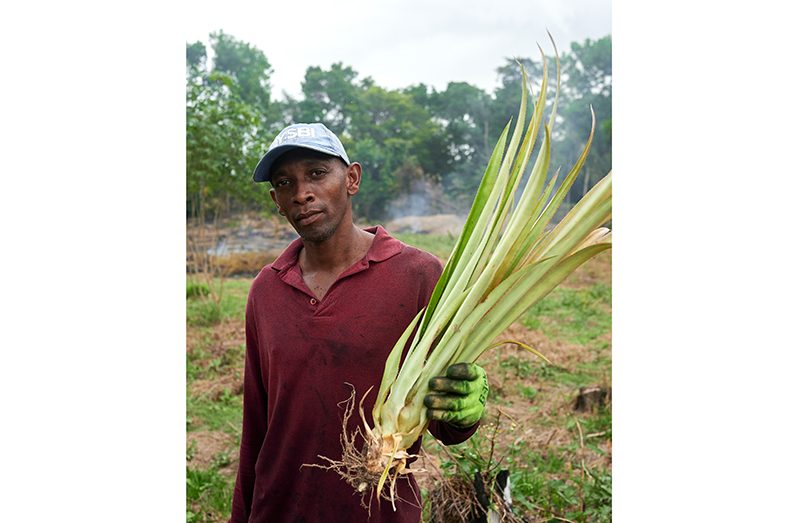From farmlands to markets
EVIDENCE of Tapakuma’s simplistic and self-sustainable way of life lies all around. The village is home to vast farmlands that are alongside the villagers’ homes, creating a unique experience. Tapakuma is home to more than 400 people, many of whom are farmers. Today, agriculture is widely thought of as large scale and with great industrial involvement. The farmers of Tapakuma, however, are used to a different way of farming. With cutlass in hand, the men and women of Tapakuma cultivate acres of land by hand. And although they do hope to develop their way of farming, they share that there is just something special about doing things the old-fashioned way.
Farmer and long-time resident of Tapakuma, David James, spoke to the Pepperpot Magazine at his Tapakuma farm. David has been a Tapakuma resident for more than a decade. Like so many of the village’s people, David was not born in Tapakuma; rather, he fell in love with the community throughout the years he has visited. He is, however, from the community of New Amsterdam in Berbice. Although two entirely different worlds, David’s decision to move to the quaint community of Tapakuma was not completely unfounded. Although he was not born in Tapakuma, his foreparents called Pomeroon home. For David, coming to Tapakuma was like coming home. He shared that, “My late foreparents were from the Pomeroon, and my wife is also from Essequibo, so we came to reside here to continue farming.”
Agriculture had been a major aspect of David’s life growing up, and it has remained so today. David is among the many farmers that Tapakuma has. Whether in the form of a kitchen garden or across tens of acres, agriculture has developed to be stable in the lives of Tapakuma’s residents. Life in Tapakuma drastically differs from what he was used to in New Amsterdam. In New Amsterdam, David shared that contrary to life in the hidden community of Tapakuma, things were far more accessible in Berbice. He shared that, “Growing up in New Amsterdam is just like here, but we have access to more resources.”
The farmer explained that some things are far easier to access and develop in the community of New Amsterdam versus the village of Tapakuma. Everything from schools and shops to markets and hospitals requires a journey out of the village. David shared that, “Living in New Amsterdam, we had access to electricity, potable water, transportation, education and so on.” Life in Tapakuma, however, is a bit different. This village is currently without running water and electricity, issues that the community’s leaders, as well as the relevant authorities, are working towards solving. David stated that, “The only source of electricity we have is solar. We do not have potable water; whenever it rains, we get potable water.”
Transportation is perhaps the biggest day-to-day challenge faced by residents of Tapakuma. The main access road into the community is a 14-mile-long trail. This has made travel in and out of the community an everyday issue for the people of Tapakuma and has had countless adverse effects. David shared that, “In terms of transportation, only people in the village have transportation that we have to wait on to get out into the town.” Transportation has also been a major contention for farmers. David and a few of his fellow farmers explained that getting their produce to the market is sometimes a collaborative effort, whereby a villager with a tractor is tasked with taking the produce of other farmers to Anna Regina and beyond.
There are various places in Guyana where farming is done on both large and small scales. But very few places have the soil diversity that Tapakuma has, and even fewer places have farmers who have mastered the cultivation of different crops. The rich, tightly packed soil of sand, loam, and clay makes Tapakuma prime farmland for countless crops, the most popular of which is pineapples. Agriculture in Tapakuma is a family affair, as David explained that most of his relatives are farmers. He stated that, “Myself and my family plant pineapples. And the period for pineapple is two years.” The two-year wait to reap what is acclaimed to be the sweetest pine on the Essequibo coast is a long one. This means it is almost impossible for farmers to survive on pine cultivation alone. Even if they do plant in stages, they cannot reap more than two or three times a year. So, the farmers have found alternatives.
David and his fellow farmers have taken up fruit cultivation, and they say it has been quite successful thus far. David shared that, “Besides the pineapples, we have permanent crops such as coconuts. We have pears, mangoes, cherries, golden apples, and passion fruit. We have a variety of things.” Agriculture is no walk in the park, but it is the backbone of a people. This is perhaps why farmers like David say that as challenging as farming is, it is their way of life — and it is an existence they do not think they will give up.



.jpg)









